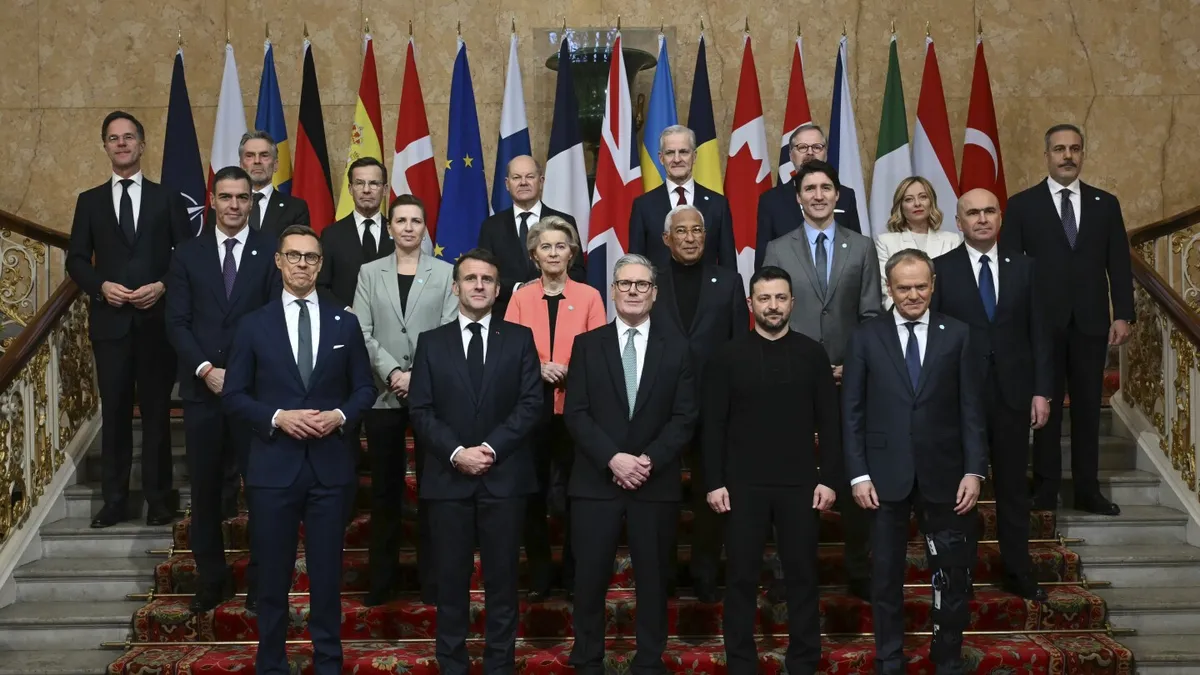
In a significant diplomatic effort, British Prime Minister Keir Starmer convened with European leaders on Sunday, urging them to strengthen their borders and fully support Ukraine amidst the ongoing conflict with Russia. Starmer emphasized the need for every nation to contribute meaningfully to the collective security of Europe, stating, “Every nation must contribute to that in the best way that it can, bringing different capabilities and support to the table, but all taking responsibility to act, all stepping up their own share of the burden.”
This meeting comes on the heels of rising tensions regarding U.S. support for Ukraine, highlighted by President Donald Trump's recent criticisms of Ukrainian President Volodymyr Zelenskyy. Starmer's call to action is a response to the uncertainty created by Trump's remarks, which questioned Zelenskyy's gratitude towards America's assistance. The Prime Minister's address aimed to reinforce transatlantic unity and support for Ukraine, as the peace process appeared to be at risk following the controversial discourse in Washington.
During the summit, which included 18 leaders primarily from Europe, Starmer outlined a collaborative framework to end the war. He noted four critical actions that the leaders agreed upon:
Continue providing aid to Kyiv and maintain economic pressure on Russia. Ensure Ukraine's participation in any peace negotiations, with a focus on preserving its sovereignty and security. Persist in arming Ukraine to deter future invasions. Establish a “coalition of the willing” to defend Ukraine and uphold peace.Starmer stressed the importance of a proactive approach, stating, “Not every nation will feel able to contribute but that can’t mean that we sit back. Instead, those willing will intensify planning now with real urgency.” He reiterated the U.K.'s readiness to support this coalition with military resources, asserting, “The U.K. is prepared to back this with boots on the ground and planes in the air, together with others.”
While Starmer’s plan aims for a united front against Russian aggression, the acceptance of such a proposal by Russian President Vladimir Putin remains uncertain. He indicated that the success of the plan would hinge on robust support from the U.S., although he did not elaborate on specifics during the discussions. Starmer noted, “If there is to be a deal, if there is to be a stopping of the fighting, then that agreement has to be defended.”
Prior to the summit, French President Emmanuel Macron suggested a potential “truce in the air, on the seas, and energy infrastructures” lasting for a month. Macron emphasized the need to utilize this period for negotiations, with the possibility of deploying troops on the ground at a later stage. This proposal highlights the ongoing diplomatic efforts to find a resolution to the conflict.
European leaders have expressed concern over the shifting U.S. stance toward Ukraine under Trump’s administration. The recent tensions following Zelenskyy’s visit to the White House highlighted fears that European interests might be sidelined. During the summit, Italian Premier Giorgia Meloni emphasized the necessity for Europe to maintain unity, stating, “Dividing the West would be disastrous for everyone.”
Starmer hosted the meeting at Lancaster House, a historic venue in London, aiming to bolster collaboration with leaders from Germany, Denmark, Italy, the Netherlands, Norway, Poland, Spain, Canada, Finland, Sweden, the Czech Republic, and Romania. The engagement also included the Turkish foreign minister, NATO secretary-general, and heads of the European Commission and Council.
European Commission President Ursula von der Leyen emerged from the discussions with a commitment to present a plan to “rearm Europe.” She stated that Ukraine requires security guarantees to fortify itself against potential threats. Starmer's administration has pledged to increase military spending to 2.5% of the U.K.’s GDP by 2027, a move likely to inspire similar commitments from other European nations.
As Europe faces this critical moment in its history, there is a pressing need for solidarity and decisive action to support Ukraine and secure peace. With the potential for heightened military spending and a unified defense strategy, European leaders must navigate these challenges effectively to deter aggression and protect their collective interests.